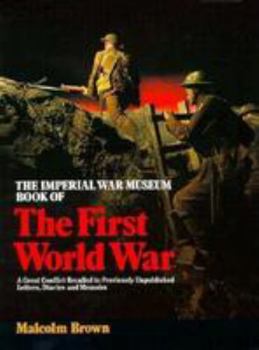The Imperial War Museum Book of the First World War: A Great Conflict Recalled in Previously........
Select Format
Select Condition 
Book Overview
No Synopsis Available.
Format:Paperback
Language:English
ISBN:080612525X
ISBN13:9780806125251
Release Date:January 1993
Publisher:University of Oklahoma Press
Length:288 Pages
Weight:1.85 lbs.
Dimensions:0.9" x 7.5" x 9.6"
Customer Reviews
1 rating
Though Provoking Compilation of Personal Military Records
Published by Thriftbooks.com User , 24 years ago
In essence, as Brown states in his preface, the Imperial War Museum is the author of this thought provoking compilation of moving textual and stunning visual records of the First World War, 1914-1918. The Museum was established in the wake of the greatest conflagration the world had ever known and has an almost inexhaustable reserve of pictures, posters, postcards, photographs, films, pamphlets, books, diaries, letters, and documents detailing the massive British effort to fight and win 'the war to end all wars.' The author does not attempt to present a comprehensive study but rather one that naturally leans towards areas in which the Museum's holdings are rich. Thus, the British role on the Western Front is emphasized although other wartime operations such as Gallipoli, Salonika, and the Middle East are not ignored. While the war was highly political and technological, the focus of this book is on the personal and the particular. The subject matter is not war so much as people caught up in war and the author clearly intends to provide a fresh look at the First World War which is as precise and objective as possible yet spiritually enriching and in context to current events. Strong editorialship is utilized to weave together personal profiles and special features with linking narrative prose which is clearly written and assimilated. In these pages great political and military figures such as David Lloyd George, Winston Churchill, and Douglas Haig appear remote and somewhat dehumanized rather than the masses of individual participants as is usually the case. For example, the reader is shocked but ultimately relieved at the situation of W.H. Wykeham-Musgrave, Royal Navy, who was torpedoed three times on the same day as the armored cruisers HMS ABOUKIR, HOGUE, and CRESSY were sunk by a single German U-boat on 22 September 1914. There is also ample evidence of the largely unheralded efforts of women in the munitions factories and in military support services such as nursing and transportation. Contemporary humor remains relevant especially in regard to the contrasting abysmal conditions in the trenches and the more comfortable home fires. In one military paper a woman asks a soldier "What struck you most about the Ypres battle?" to which he replies "Shrapnel, lady." (p. 265). Finally, the book concludes with the disillusioned observations of one soldier who argues that "the old order had changed; the genteel of 1914 were gone; blatent riches reigned in their stead; money was the power in the land; money that had been reaped from the bodies of the dead. This was victory. The war to end war" (p. 282). Such a loss of idealism in the aftermath of this cataclysmic horror became the zeitgeist for an entire 'lost generation' and is well represented in this book and masterfully communicated to the reader.





